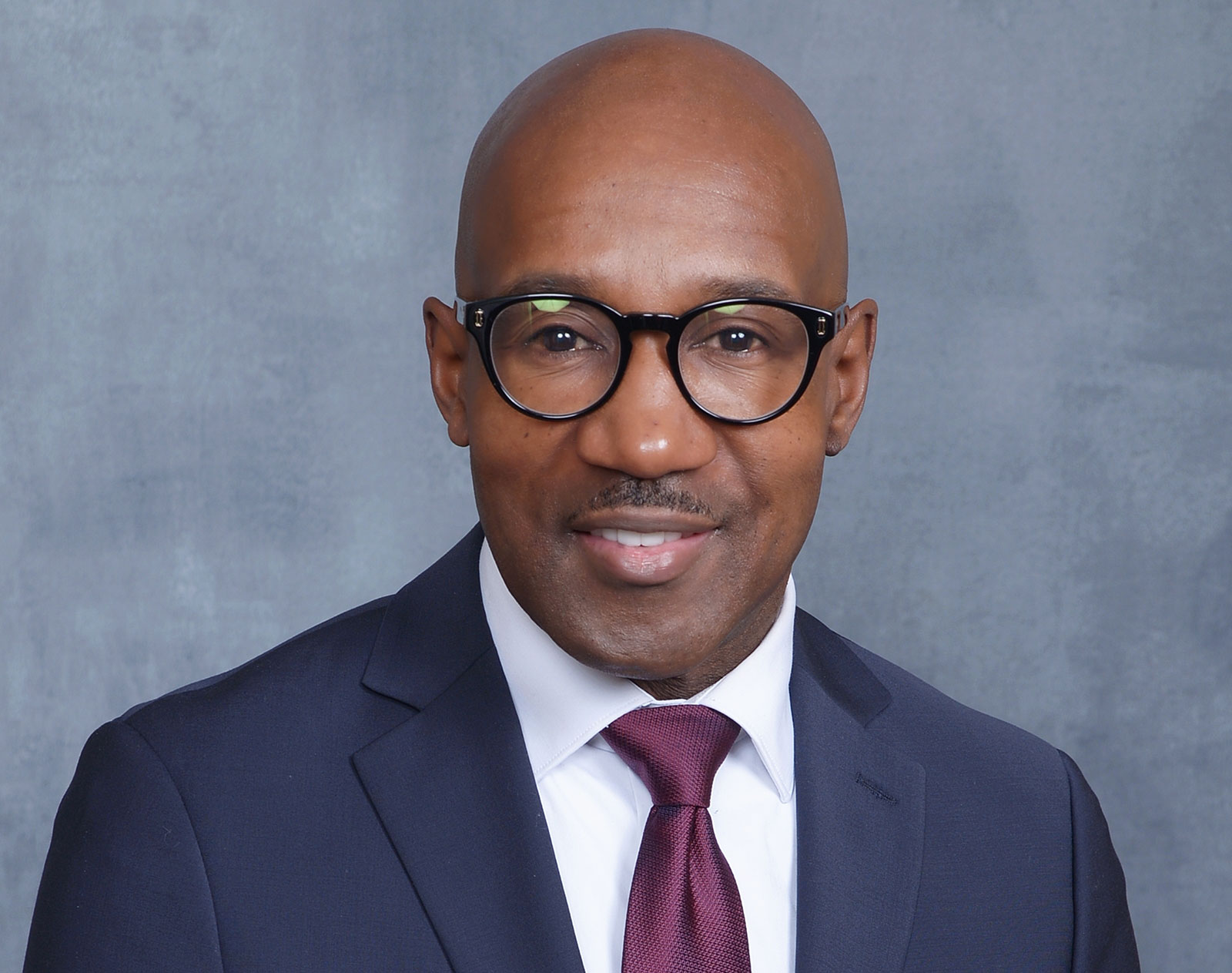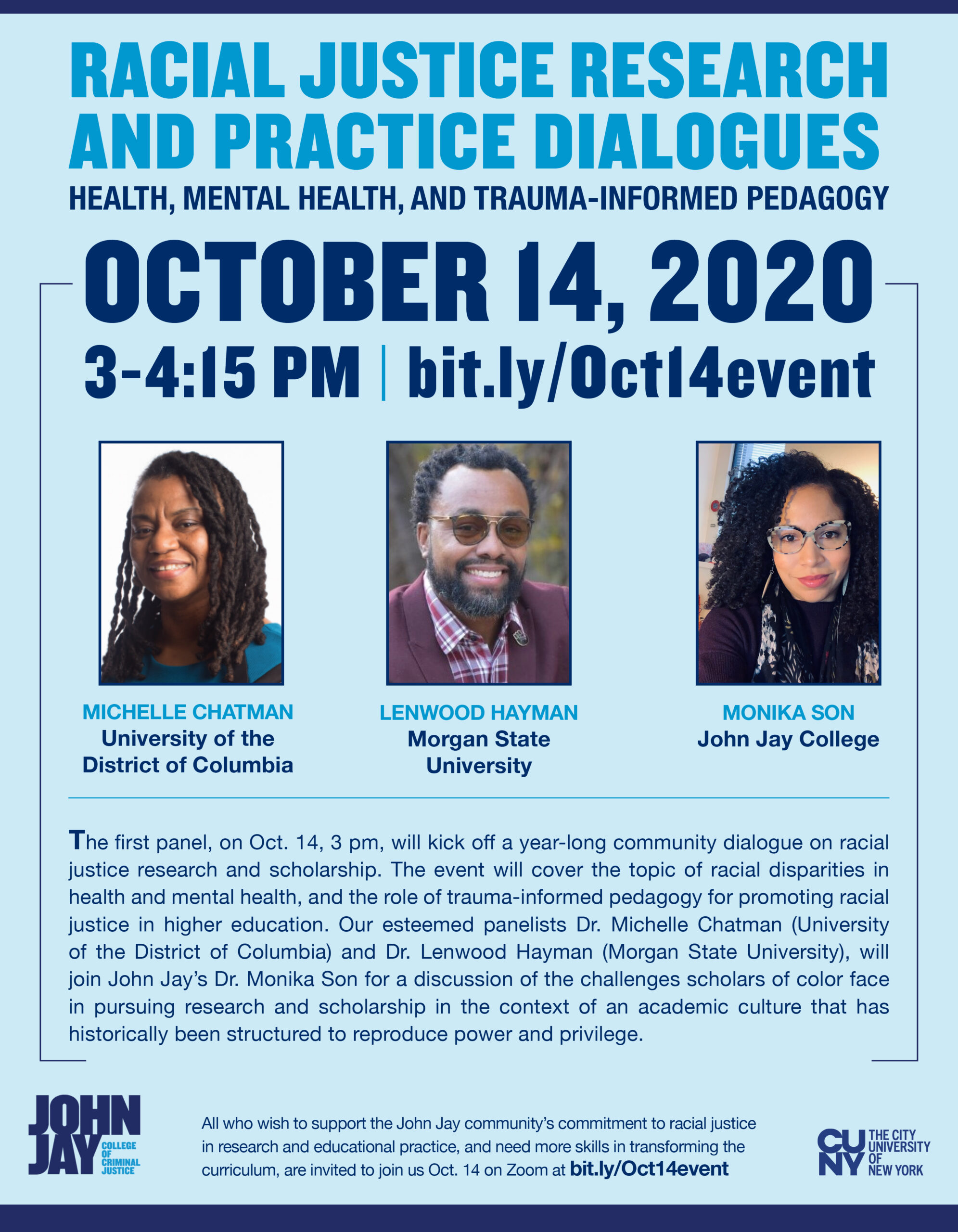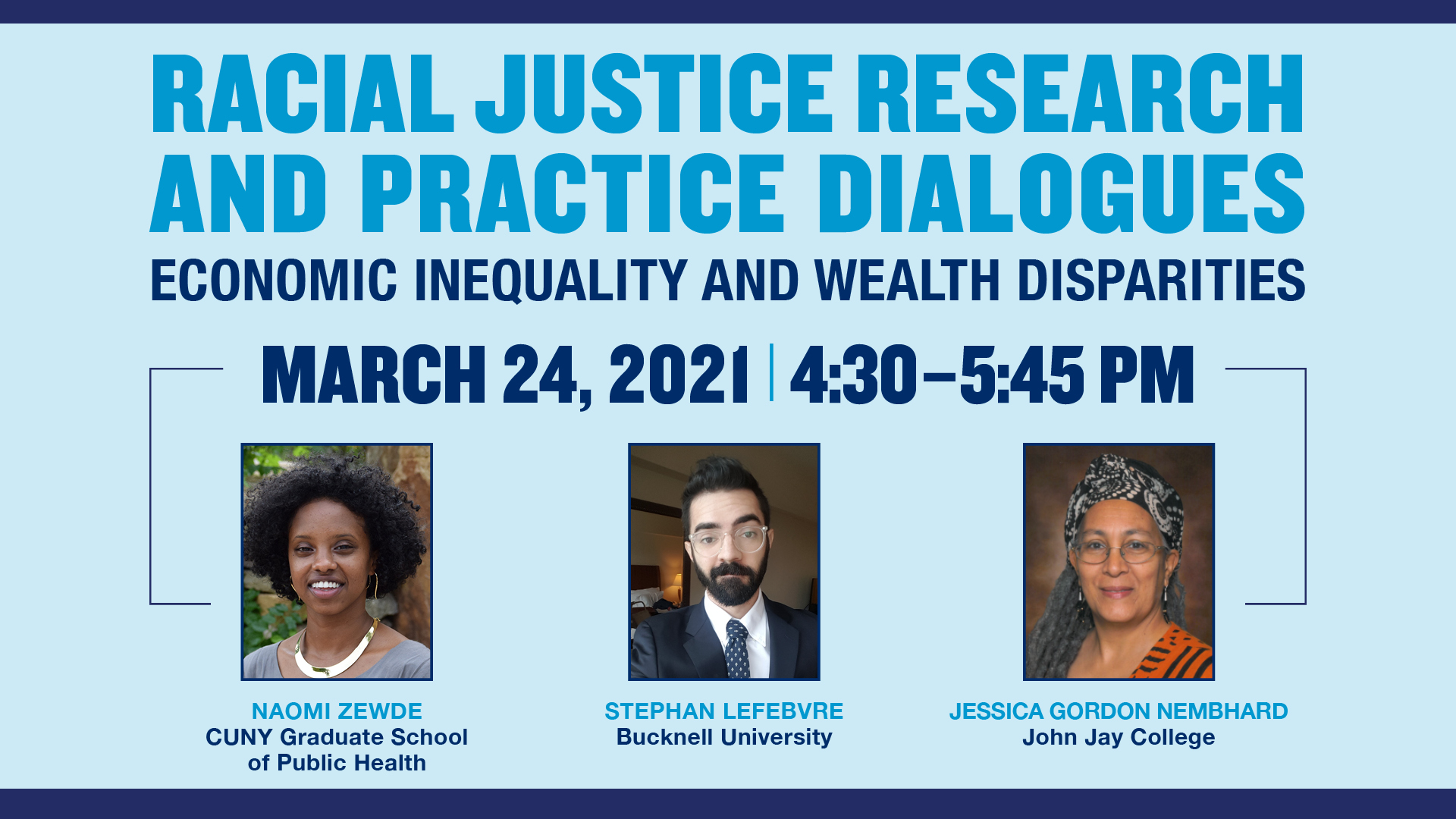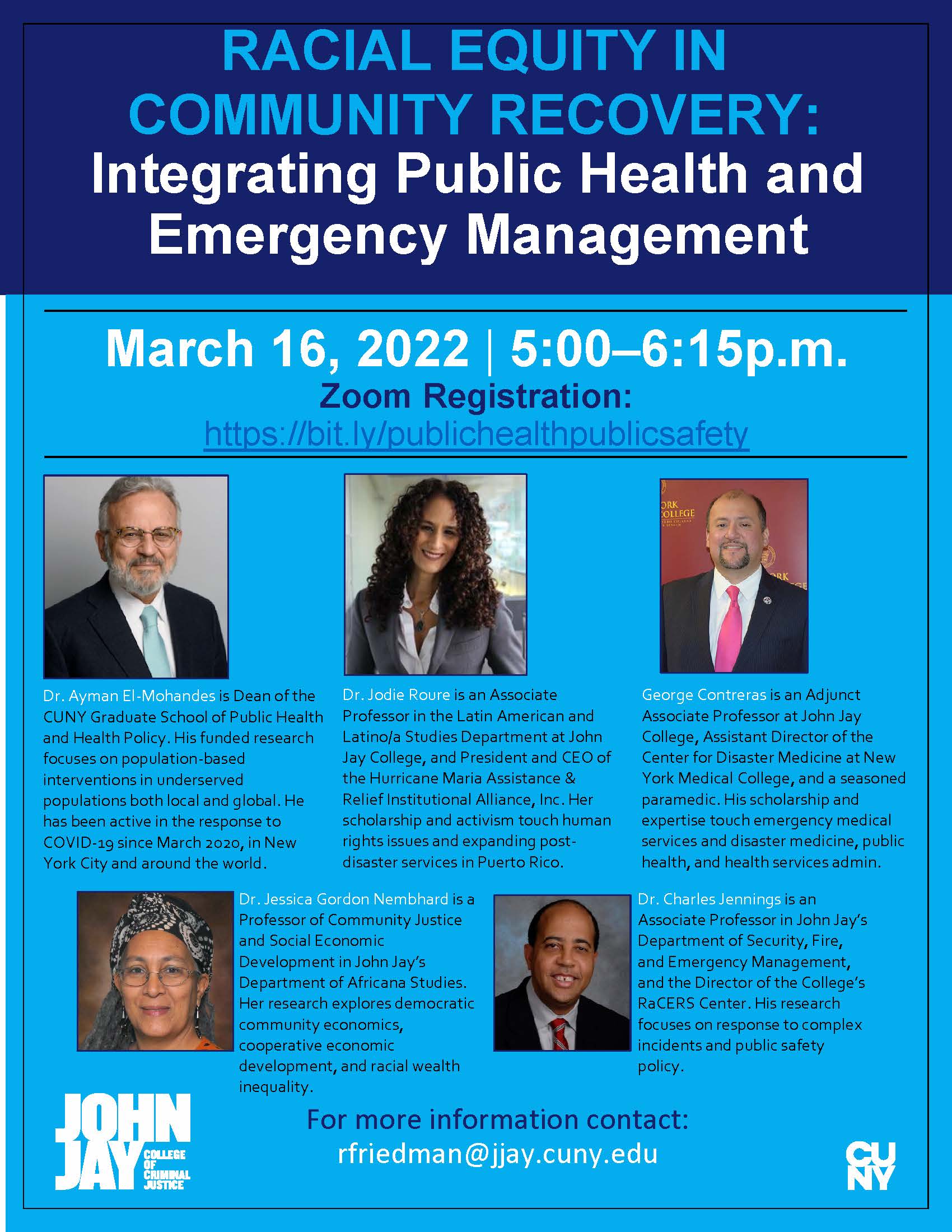Home » Posts tagged 'Racial Justice Research and Practice Dialogues'
Tag Archives: Racial Justice Research and Practice Dialogues
John Jay Institute Director Champions Education, Advocacy, and Policy Change for Black Empowerment

In celebration of Black History Month 2024, Andre Ward, the Executive Director of the John Jay Institute for Justice and Opportunity, reflects on a journey shaped by personal experiences within the criminal legal system. From incarceration to becoming the John Jay Research Center Director, his experiences drive a vision to empower formerly incarcerated individuals through education and to influence policy changes addressing social and racial inequalities. Read more about his background in the Q&A below.
As we celebrate Black History Month, can you share a bit about the journey that led you to John Jay’s Institute for Justice and Opportunity and a professional achievement that you believe has contributed to advancing justice and opportunity for the Black community?
I came to the institute as a result of my past involvement with College Initiative in 2009. I was released from incarceration on January 16, 2009 (the day Martin Luther King Jr’s birthday was observed), and two weeks later, I enrolled in Medgar Evers College. Earning both undergraduate and graduate degrees from CUNY’s Medgar Evers and Herbert H. Lehman Colleges, respectively, created opportunities for me to deepen my commitment to empowering the Black Community. After earning my Master’s Degree in Social Work, I was asked by the department chair at Medgar Evers College to return as an adjunct lecturer, where I taught mostly Black (and Latinx) students for 4 ½ years. Following this professional achievement, I localized myself in non-profit reentry/policy/advocacy work, culminating in a major New York City legislative win with the passage of the Fair Chance for Housing Act in December 2023. This legislation would prevent people with a conviction record from being discriminated against when applying for housing. For many justice-impacted college students like those whom we serve at the Institute for Justice and Opportunity, housing is indispensable to creating stability. This important legislation would protect them and the other 750,000 New Yorkers (80% of whom are Black and Latinx) from being denied access to housing solely on the basis of past justice system involvement.
How has your previous experience prepared you for the role of Research Center Director at the Institute for Justice and Opportunity?
Being directly impacted by the criminal legal system and working with diverse groups and students who had and did not have justice system involvement has prepared me for the role of Research Center Director at the Justice and Opportunity Institute. Additionally, my training as a social worker, policy/legislative change agent, and advocate for justice, fairness, and equity in education, employment, and housing – especially for people with conviction records – has also prepared me for this role. Serving in various capacities in New York City non-profit starting with providing job readiness/career coaching to facilitating academic and life skills workshops for students at Baruch College’s SEEK program and overseeing restorative justice/alternatives to incarceration work for young adults ages, serving as director of workforce development and executive leveled roles in advocacy and education and employment services, has prepared me for this role. My experience of being incarcerated has also served to prepare me for this role.
What is your vision for the Institute in promoting justice and opportunity, particularly within the context of Black communities?
My vision is to expand how we equip formerly incarcerated students with the knowledge and skills necessary for securing gainful employment, an essential factor often impeded by the stigma of a criminal record. Deepening existing stakeholder relationships while simultaneously innovating in areas of program service provision is part of my vision to move toward national and international education efforts.
Given the current social and racial inequalities landscape, how do you see the institute’s role in influencing policy changes that address these disparities?
The institute can support advocacy efforts that address discrimination in education. It can also join voting rights efforts to get our students involved in changing policy/legislation that impacts their lives. Through narrative sharing and engaging elected officials in the city and state, IJO’s students can become empowered to organize their communities to facilitate change. By doing so, members of the community become co-creators of public safety, thus creating the world they want to see and be in.
How do you see the institute actively contributing to the ongoing narrative of Black history and progress?
Education transcends the mere acquisition of knowledge; it serves as a catalyst for personal transformation. For formerly incarcerated individuals, this transformation can be profound. Education instills self-worth, purpose, and a vision for the future, offering a beacon of hope and a pathway to self-improvement. IJO will continue to serve as a place where justice-involved students can come. And through the impact IJO has on students, coupled with students developing an understanding of themselves, they will become assets to the community, creating a history of contribution that adds value to the black community and humanity.
IJO will actively nurture essential life skills, including critical thinking, problem-solving, and decision-making, which can be a powerful tool for psychological healing, helping individuals overcome the stigma and emotional burdens associated with their criminal history.
Western and Redburn (2017) emphasize in their seminal work, Education as Crime Prevention: The Case for Reinvesting in Prison Higher Education, that the role of education is to serve as a platform for self-improvement and a means for shifting individuals’ perspective from their past to their potential. This transformational aspect of education is pivotal in successfully reintegrating formerly incarcerated individuals into society, and IJO will maintain this work – especially during Black History Month.
How are you celebrating Black History Month?
I am celebrating Black History Month by actively making monetary and skills contributions to small Black organizations that support the communities we come from and focus on reentry and higher education services for people with a conviction record. I am also celebrating the amazing good fortune I have to serve our students alongside my deeply committed colleagues at IJO. Together, we are making a difference in the lives of Black people in particular, and humanity generally – one powerful academic student at a time.
Read more about the John Jay Institute for Justice and Opportunity here.
Racial Justice Research and Practice Dialogues 2020-23
The Office for Academic Affairs through its Office for the Advancement of Research, in collaboration with Undergraduate Studies and a faculty leadership committee representing Africana Studies (Jessica Gordon-Nembhard), Latinx Studies (José Luis Morín), and SEEK (Monika Son), sponsored a year-long community dialogue on racial justice research and scholarship across the disciplines. John Jay College faculty, students, and the broader community were invited to join four panel discussions and four hands-on workshops that invited a more in-depth discussion about changing the ways we teach and learn – specifically, by facilitating meaningful engagement with scholarship by and about people of color, and promoting the incorporation of research on structural inequities into curriculum college-wide. Over the course of the 2020-2021 academic year, events covered multi-dimensional topics including:
- racial disparities in health and mental health and trauma-informed pedagogy;
- the erasure of people of color from the historical narrative;
- economic inequality; and
- racism and discrimination in the criminal legal system.
Each panel was facilitated by a John Jay faculty member who also led a follow-up workshop intended to engage participants more deeply in the subject matter and promote best practices for cultivating racial justice in our classrooms and around the college. Each panel was recorded, and the recordings can be found below, as well as resource guides for further self-guided learning and curricular reform.
Series events, recordings and resources
 Event #1: Health, Mental Health, and Trauma-Informed Pedagogy
Event #1: Health, Mental Health, and Trauma-Informed Pedagogy
Panelists: Dr. Michelle Chatman (UDC) & Dr. Lenwood Hayman (Morgan State University)
Facilitator: Dr. Monika Son (JJC)
Event recording: https://youtu.be/NYTxARHOALw
Resources:
- Ayers, W., Ladson-Billings, G., & Michie, G. (2008). City kids, city schools: More reports from the front row. The New Press. Introduction, pgs 3-7.
- Chatman, MC. (2019). Advancing Black Youth Justice and Healing through Contemplative Practices and African Spiritual Wisdom. The Journal of Contemplative Inquiry, 6(1):27-46.
- Monzó, L. D., & SooHoo, S. (2014). Translating the academy: Learning the racialized languages of academia. Journal of Diversity in Higher Education, 7(3), 147–165. DOI: 10.1037/a0037400
- Yolanda Sealey-Ruiz, Arch of Self, LLC, https://www.yolandasealeyruiz.com/archaeology-of-self
For additional suggested readings, prompts for discussion, and curricular resources, download our full event guide: RJD Event 1.1 Homework and Readings.

Event #2: Race and Historical Narrative — Correcting the Erasure of People of Color
The second panel in the OAR/UGS Racial Justice Research and Practice Dialogues series, on November 11 at 3 pm, will shine a light on the erasure of people of color from the historical narrative commonly taught in the United States. This erasure is harmful to students of color in particular, as they do not see themselves represented in the stories told about this country, and actively harms people of all races by failing to present an accurate picture of the country’s founding and history.
Panelists: Dr. Paul Ortiz (UFL) & Dr. Suzanne Oboler (John Jay College)
Facilitator: Dr. Edward Paulino (John Jay College)
Event recording: https://youtu.be/WRIDHIA_a94
Resources: For suggested readings that may be helpful in placing the panel discussion in context, download the RJD Event 2.1 – Readings.

Event #3: Economic Inequality and Wealth Disparities
Panel Discussion – March 24, 2021, 4:30 – 5:45 pm
Panelists: Dr. Naomi Zewde (CUNY SPH) & Dr. Stephan Lefebvre (Bucknell University)
Facilitator: Dr. Jessica Gordon Nembhard (JJC)
Event Recording: https://youtu.be/_lp93i3EHqE
Resources: For suggested readings that may be helpful in placing the panel discussion in context, download the Racial Justice Dialogues – Economic Inequalities – Resources.
 Event #4: Racism in the Criminal Legal System
Event #4: Racism in the Criminal Legal System
Panel Discussion – April 21, 2021, 3 – 4:15 pm
Panelists: Dr. Jasmine Syedullah (Vassar College) & Professor César Cuauhtémoc García Hernández (University of Denver, Sturm College of Law)
Facilitator: Professor José Luis Morín (JJC)
Recording: https://youtu.be/OZ8N-c7Gob0
Resources: For suggested readings that may be helpful in placing the panel discussion in context, download the Racial Justice Dialogues – Resources – Racism in the Criminal Legal System
The series continued in academic year 2021-2022, expanding the scope of the discussions with panels on racial equity in disaster recovery.
 Event #5: Racial Equity in Community Recovery: CBOs, NGOs, and Government Collaboration
Event #5: Racial Equity in Community Recovery: CBOs, NGOs, and Government Collaboration
The fifth panel took place on November 1, 2021, and addressed the interdependent roles of government agencies, community-based and non-governmental organizations in promoting or hindering equitable outcomes in post-disaster situations. Panelists included Kim Burgo (Catholic Charities), Craig Fugate (One Concern), Dr. Jason Rivera (Buffalo State College), Dr. Warren Eller (John Jay College), and Dr. Dara Byrne (John Jay College). Find the recording at https://www.youtube.com/watch?v=LQkjxw6RcKg.
 Event #6: Racial Equity in Community Recovery: Integrating Public Health and Emergency Management
Event #6: Racial Equity in Community Recovery: Integrating Public Health and Emergency Management
The sixth panel in the series, which took place on March 16, 2022, continued the theme of racial equity in disaster recovery. Panelists explored the overlapping roles of the institutions of public health and public safety in promoting equitable outcomes in post-disaster recovery, addressing the intersectional challenges faced by people of color and other marginalized communities. The conversation took special note of the particular context of post-COVID recovery. The participants were Dr. Ayman El-Mohandes (CUNY Graduate School of Public Health), Dr. Jodie Roure (John Jay College), and George Contreras (New York Medical College, John Jay College). The moderators were Dr. Jessica Gordon Nembhard and Dr. Charles Jennings (John Jay College). A full recording of the event is available at https://www.youtube.com/watch?v=4u9wUyjr5Sg&list=PL-B85PTQbdJj5UJhqiddjs1_9p90pZXTZ&index=6.
Resources:
- , 2020: COVID-19: A Barometer for Social Justice in New York City, American Journal of Public Health
- El-Mohandes, A., White, T.M., Wyka, K. et al. COVID-19 vaccine acceptance among adults in four major US metropolitan areas and nationwide. Sci Rep
- Roure, Jodie G. The Reemergence of Barriers During Crises and Natural Disasters: Gender-Based Violence Spikes Among Women and LGBTQ+ Persons During Confinement. Seton Hall Journal of Diplomacy and International Relations, pp 23-50, 2020.
- Jodie G. Roure, 2020 presentation: Children of Puerto Rico & COVID-19: At the Crossroads of Poverty & Disaster.
- Jodie G. Roure, Immigrant Women, Domestic Violence, and Hurricanes Irma and Maria in Puerto Rico: Compounding the Violence for the Most Vulnerable. The Georgetown Journal of Gender and the Law, 2019.
- Contreras GW, Burcescu B, Dang T, et al. Drawing parallels among past public health crises and COVID-19. Disaster Med Public Health Prep. doi: https://doi.org/10.1017/dmp.2021.202.



Recent Comments